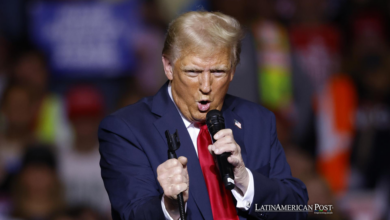It’s Time to End the Ineffective and Inhumane U.S. Embargo on Cuba
As the United Nations General Assembly casts an overwhelming vote against the U.S. embargo on Cuba, it's time to scrutinize this long-standing policy. This anachronistic embargo serves as a stark reminder of a bygone era, failing to promote democracy and only exacerbating the suffering of the Cuban people

Photo: LatinAmerican Post
The Latin American Post Staff
Escucha este artículo
Leer en español: Es hora de poner fin al ineficaz e inhumano embargo estadounidense a Cuba
Outdated Cold War Relic
For over six decades, the U.S. embargo on Cuba has stood as a pillar of failed policy, a relic of the Cold War that has outlived its purpose. The United Nations General Assembly's vote to condemn the embargo for the 31st consecutive year is more than a ritual; it is a global plea for humanity, an insistence on rationality, and a testament to the international consensus that the embargo is a blunt instrument of suffering, not a tool for democracy.
A Unanimous Global Chorus
The record-tied vote, with 187 nations in favor, reflects a nearly unanimous voice in the global community. The chorus is clear: Let Cuba live. It is not just about politics; it's about the fundamental right to economic security and development, about the kind of world we aspire to be a part of — one that champions cooperation over isolation, bridges over walls.
The embargo, painted as a promoter of democratic values and human rights, instead undermines these ideals. Its real-world impact has inflicted economic hardship on the Cuban people, limiting access to essential goods and stifling economic growth. By attempting to isolate the Cuban government, the U.S. has inadvertently isolated itself, stubbornly clinging to a Cold War mentality in a world that has long since moved on.
The Suffering of the Cuban People
Cuba's designation as a country that endures "the most cruel and long-lasting unilateral coercive measures" is no hyperbole. The embargo is a sweeping measure that punishes not the government but the people, the very individuals whose rights and freedoms the U.S. professes to support. The continuation of this policy contradicts the American values of freedom and liberty. It raises an ethical question: Can an approach that leads to food shortages and a lack of medical supplies ever be a just tool of foreign policy?
Indeed, Cuba's economy is not thriving, and the argument stands that lifting the embargo would hardly turn the nation into an overnight success. However, it is also undergoing a significant transformation, evident in the emergence of over 8,000 private enterprises since the legalization of small and medium-sized ventures. This spirit of entrepreneurship and self-determination is the seed from which a more open society can grow — but it is a seed that requires the sunlight of international trade and the water of economic opportunity to flourish.
Engagement Over Isolation
Critics point to Cuba's human rights record, and rightfully so. Yet, history has shown that engagement, dialogue, and mutual respect lead to progress, not the continuation of an embargo that serves as a crutch for the Cuban government to excuse its failures and a rallying cry against external oppression. It is a policy that fuels nationalism and defensiveness rather than fostering openness and reform.
Furthermore, the U.S. stands nearly alone in this endeavor. Its unwavering stance on sanctions contrasts with the global movement toward engagement, diplomacy, and international cooperation. The strategic and moral calculus is off-balance; the embargo does more to hinder the U.S. image and influence than to catalyze change in Cuba's governance.
Missed Opportunity for Leadership
By maintaining the embargo, the U.S. also misses an opportunity to be a leader in supporting the Cuban people during their economic transformation. There is an opening to foster goodwill, to keep the budding private sector, and to lay the groundwork for a future relationship rooted in partnership rather than paternalism.
The argument that the embargo is a set of tools to advance democracy is, unfortunately, undermined because it has not achieved this aim after more than 60 years. Instead, it has proven to be a barrier to the kind of constructive engagement that can facilitate change. By persisting with the embargo, the U.S. not only disregards international opinion but also undermines its own stated goals of supporting human rights and self-determination.
Also read: Red Telephone: What Is It And Why Is The US Planning To Recreate It?
Embracing a New Approach
In a world that increasingly values interconnectedness and shared solutions to global challenges, the embargo is an anachronism. It's time to end this outdated policy, not out of naivety about the difficulties of promoting democracy and human rights, but out of a pragmatic recognition that the embargo is not the solution — and never was. It's time to offer Cuba the dignity of engaging with the world on equal footing, to allow the Cuban people the right to determine their own future, and to replace the failed embargo with a policy that truly reflects the best of American values.




